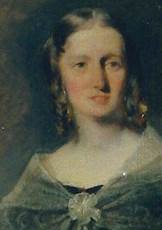Lloyd the Man
Edward Lloyd comes across as intelligent, cheerful and inspiring of loyalty and affection among those who knew him. For example, Tom Catling, a long-term employee and later editor of Lloyd’s Weekly, wrote warmly of him. His stories of life at the newspaper show Edward’s propensity for both humour and humanity. He won the esteem of many who met him in the course of business.
This is greatly at odds with his reputation as it developed in the 20th century. Most commentators simply ignored him. Of those that mentioned him, many were contemptuous&mdas;his business practices condemned as greedy, unscrupulous and mean, his private life licentious, and his publications worthless.
This change of attitude seems to have occurred some years after the turn of the century. In the 1906 obituary of Edward’s daughter, Clara Coggin, a clergyman at St Margaret's described Edward as &ldqui;a bright, genial and loveable man, who found a ready helpmeet in his wife in all his works of practical goodness about which there was no spice of egotism or pride”.
An author identified only as ”GG”, writing in the early 1900s, said that he was “held in universal admiration by all who came into contact with him”.
Henry Massingham, a few years before his appointment as the influential editor of the Daily Chronicle, described him as “one of the most notable of modern captains of industry” with “a reputation as one of the shrewdest and most long-headed organisers of modern industry”.
“Edward Lloyd was one of that brave, devoted and intelligent band of news vendors supporting with hard fighting such heralds of free speech as Hone, Horne, Hunt, Jerrold, Knight etc,” the American Henry Llewellyn Williams wrote in The New York Times on 20 August 1904.
The London correspondent of the South Australian Chronicle wrote in an obituary: “He was one of the great entrepreneurs of his age. […] there was not a member of the [Daily Chronicle] staff who had not the profoundest respect for his clear sightedness, his genius for ‘business,’ his good sense and judgment. […] Personally he was a very interesting man, his talk — shrewd, penetrating, and pertinent—being a reflection of his character.”
The Nottingham Evening Post,Wednesday 09 April 1890 remarked As to his relations with his employees, it is sufficient to point out that two brothers in the machine and publishing departments has been engaged for 46 and 45 years respectively, while the oldest compositor numbers 38 years
His improved financial position in the early 1840s allowed him and his brother Thomas to join the Worshipful Company of Spectacle Makers where Lloyd is registered as a “bookseller”. He was not alone—membership in that period included 34 booksellers and 14 publishers.
People have queried his entering two of his sons as “farmer’s sons” on the 1881 Census. But, he did have farms. In 1852, Douglas Jerrold’s salary was supplemented by a weekly basket of fresh produce from “a small farm owned by Mr Lloyd” The Walthamstow estate included 90 acres of farmland where he employed nine men and three boys. Some of his family spent time at the farmhouses in childhood.
It is impossible to do more than speculate about Lloyd as a family man. He seems to have been solicitous for the welfare of them all, certainly in the disposition of his property. He and Maria brought up the three children already born to him when they met, treating the unambiguously illegitimate Frederick entirely equally with the others.
In relation to his sons, an account written in 1902 said: “Practical in everything, Edward Lloyd was so in the education of his sons. They were trained for a business life, that training including an almost invaluable Continental experience. Thus, as they became [?], they joined their father in the conduct of the ever-increasing business. The sons who have taken an active part were Frank, Herbert, Arthur, Harry and Fred.” Only Percy, his youngest son born in 1869, was educated at university.
The naming of three river barges after the first three of his children with Maria — Annie, Frank and Alice — suggests affection and good humour. The three were in their mid-teens at the time.
It is certain that Edward’s children failed to pass any telling detail on to their own children. At least two grandsons (Teddy Bullen and Maurice Coggin) saw the family as a group of dull stuffy Victorians, including Edward. As both were rebelliously minded when young, they would have relished his rakish early life, not disowned it.

